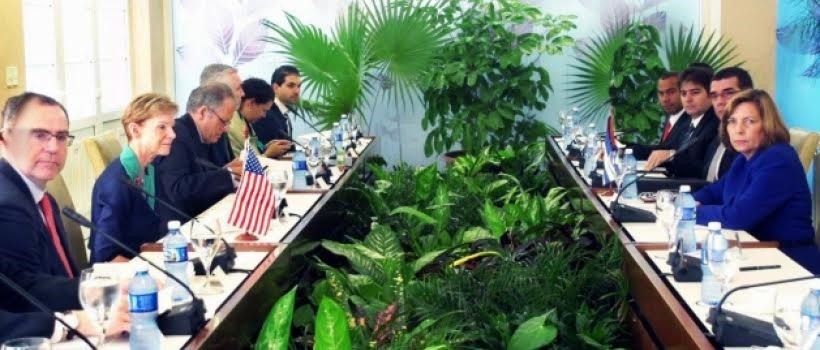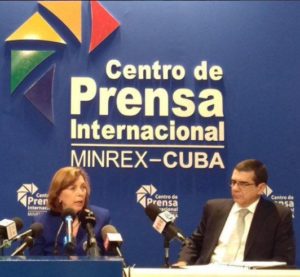
At talks with U.S., Cuba calls the lifting of the blockade ‘a priority’
The Cuban Foreign Ministry on Monday (May 16) issued the following press release.
—-
The third meeting of the Cuba-U.S. Bilateral Commission was held in Havana on May 16, 2016.
The Cuban delegation was headed by Josefina Vidal Ferreiro, Director-General of the U.S. Division at the Ministry of Foreign Affairs of Cuba, and the U.S. delegation was headed by Ambassador Kristie Kenney, Counselor of the State Department, and John S. Creamer, Deputy Assistant Secretary of State for Western Hemisphere Affairs.
During the meeting, both delegations reviewed the implementation of the agreements adopted at the second meeting of this Commission as well as the results achieved in the course of the last six months.
Both delegations highlighted the increase of official visits in both directions, including the one paid by President Barack Obama to Havana in March 2016; as well as of the technical meetings held to discuss topics of common interest and the bilateral instruments signed in order to expand mutually beneficial cooperation between Cuba and the United States.
However, similar advances have not been seen in the economic field because of the continued implementation of the blockade. Despite the steps that have been taken, there are still significant restrictions that limit U.S. exports; very few Cuban products can be imported by the United States; U.S. investments in Cuba are not allowed except in telecommunications; and there are no normal banking relations between both countries.

Therefore, the Cuban delegation insisted that the lifting of the blockade is a priority, because it continues to harm the Cuban people and Cubaís relations with third countries, and is also the main obstacle to the development of our economy.
Likewise, the Cuban delegation reaffirmed the need for the territory illegally occupied by the Guantánamo Naval Base to be returned to Cuba, and called for the abrogation of other policies enacted in the past which stamped bilateral relations with a hostile character and are still in force.
Both delegations identified the steps they will be taking during the next months as part of the process towards the improvement of relations, namely, the materialization of high level visits as well as technical exchanges on environmental protection, hydrography and law enforcement, which include the combat of trafficking in drugs and persons, and migration fraud.
Both delegations expressed their intention to sign new agreements to cooperate in areas such as health, agriculture, meteorology, seismology, protected land areas, oil spill response, the combat of drug-trafficking and search and rescue operations, among others. They also agreed to initiate a dialogue on intellectual property and follow up on those dealing with climate change and the economic and commercial regulations in force in both countries.
The Cuban delegation reiterated the Cuban Government’s willingness to continue advancing during the next few months towards the construction of a new type of relationship between both countries, based on a professional and respectful dialogue, equality and reciprocity.
Both delegations agreed to hold the fourth meeting of the Bilateral Commission in September 2016, in Washington D.C.
On Tuesday, May 17, the second meeting of the law enforcement dialogue between authorities from both countries will be held in Havana.
*****
Photo at top: The U.S. delegation was headed by, from left, John S. Creamer, deputy acting Secretary of State; Kristie Kenney, State Department Counselor; and Jeffrey DeLaurentis, U.S. chargé d’affaires. The Cuban delegation was headed by, from right, Josefina Vidal, director of the Foreign Ministry’s U.S. Division; José Ramón Cabañas, Cuban Ambassador to the U.S.; and Abel González Santamaría, advisor on Defense and National Security.

